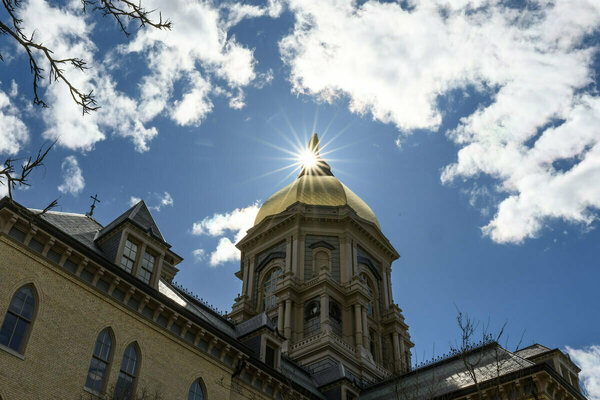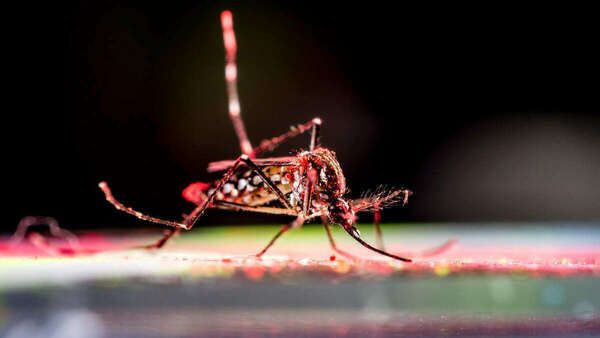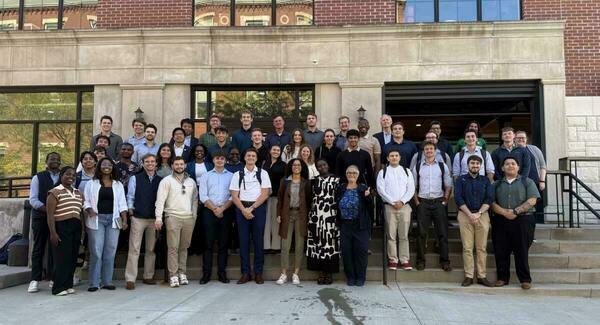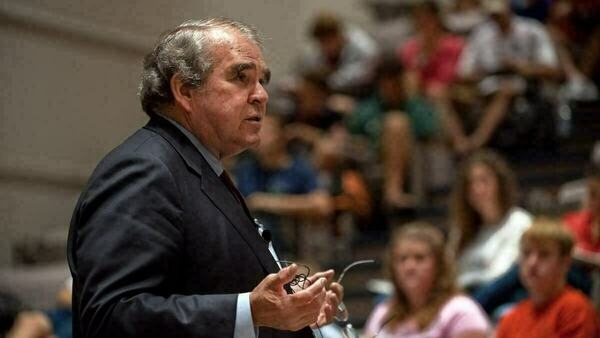Slavic and Eurasian studies professor wins Humboldt fellowship to research how Russia’s religious past shapes its present
When Russia invaded Ukraine on Feb. 24, 2022, Sean Griffin realized his second book needed a new title.
Griffin, an associate professor in the University of Notre Dame’s Department of German, Slavic, and Eurasian Studies, researches the history of the Russian Orthodox Church and its role in historical and present-day Russian politics. His second book was originally meant to focus on the memory politics of the church and its partnership with Vladimir Putin.

But he recognized that what he saw on the news that day — Patriarch Kirill of Moscow blessing Russian soldiers for battle — was a chilling new chapter in the story of Russian religion: the moment when the church was weaponized to justify the invasion.
Griffin’s observations of the past and present became Putin’s Holy War: Sacred Memory and the Russian Invasion of Ukraine, in which he explores the religious forces behind President Vladimir Putin’s 25-year reign and the invasion of Ukraine.
“I’m interested in liturgy, ritual, memory, identity — the stories, the myths, that imagined political communities tell themselves to make themselves and sustain themselves,” Griffin said.
In pursuit of that interest, his next book, tentatively titled “God is with Us: Liturgy and the History of Holy War in Russia and Ukraine,” will take on a grander scope to examine the role of liturgy over a millennium of Eastern Slavic history. Griffin will spend the 2025-26 academic year working on this project in Germany, supported by a research fellowship from the Alexander von Humboldt Foundation.
“Anytime you win a fellowship like this, it is like manna from heaven,” he said. “I was absolutely thrilled to learn that I won the Humboldt — arguably the most prestigious external research fellowship in Germany.”
The Humboldt fellowship brings experienced global researchers to Germany to collaborate with local institutions. Griffin will be sponsored by the University of Regensburg, a leader in the field of liturgical studies. The fellowship will give him the resources he needs to test his hypothesis.
Griffin posits that there is a consistent ideology of holy war in Slavic Eastern Europe rooted in the liturgical services of the Byzantine Empire. This theory provides him with a research path that connects key points in his career as well as the past and present. While his second book engaged with current conflicts, his first focused on the foundational passages of East Slavic history and traced them back to the stories prayed, chanted, and sung by the monks and clerics who chronicled the past.
“Even though a thousand years have passed, and empires have come and gone, and rulers have come and gone, and the geography and the languages of Europe have developed dramatically — one thing remains the same,” Griffin said. “And that is the famous silhouette of the onion dome churches.”
Griffin views liturgy within these churches as an imperial Roman political tool for the creation and control of cultural memory. Like typical Christian liturgy, Eastern Christian liturgy covers the life of Christ and his disciples, but it also promotes sacred narratives on subjects like Constantine the Great, the Roman Empire, and Prince Vladimir, the first Christian ruler of the first East Slavic state.
“A cynical Soviet historian said, ‘History is just politics tilted back into the past.’ That’s probably the thing that unites my three projects more than anything.”
- Sean Griffin, associate professor of Slavic and Eurasian studies
Some of those are myths about holy empires — and the holy wars they wage.
“Orthodox clergy have repeated the same story about holy war, and then that narrative flows out of the liturgy through the lips and sermons and speeches of the clergy into the ears of the politicians and the soldiers,” Griffin said.
The goal of his research is to excavate the ideology of holy war from within liturgical rituals and show how it has played out in Russian politics and culture, from the Baptism of Rus in 988 to the Russian invasion of Ukraine in 2022.
“We’ll see if it’s there,” he said. “I could be wrong; it’s a hypothesis.”
Assuming Griffin is on the right track, his research will expose a foundational continuity between the Russia of today and the Russia of a thousand years ago. Many people see themselves fundamentally separate from the medieval and premodern worlds, Griffin said, but the history of Russia shows these eras aren’t so different.
It’s the same sacred myths telling past and present Russians who they are, where they came from, and why they’re doing what they’re doing. And according to Griffin, every generation’s regime can manipulate these myths to fit their politics.
“A cynical Soviet historian said, ‘History is just politics tilted back into the past,’” Griffin said. “That’s probably the thing that unites my three projects more than anything.”
Originally published by at al.nd.edu on July 02, 2025. Republished at medieval.nd.edu on October 01, 2025.
Latest Research
- Notre Dame Research accepting applications for fall internal research grantsThe application window is now open for the Research and Scholarship Program (RSP) – Regular Grant (RG). This grant program aims to support Notre Dame faculty researchers and programs that advance the University’s research enterprise, scholarly output, and creative endeavors through a competitive funding…
- Francis and Kathleen Rooney make transformative gift for Notre Dame institute focused on democracy research and educationFrancis and Kathleen Rooney of Washington, D.C., and Naples, Florida, have made a gift to the University of Notre Dame to endow an institute in the College of Arts & Letters committed to the preservation of American democracy through research, teaching and public engagement. The Rooney Democracy Institute, formerly known as the Rooney Center for the Study of American Democracy, aims to advance Notre Dame’s role as a national and global leader in democracy scholarship and as a convener of bipartisan conversations about the future of democracy.
- Shaping Innovation within the Notre Dame Ecosystem: An Alumni Spotlight with Ben Hoggan ‘15Meet Ben Hoggan, an ESTEEM alumnus from the Class of 2015. Before ESTEEM, Ben received a bachelor's degree in physics from Utah Valley University. From first hearing about ESTEEM after receiving a free application code when he took the GRE, to working at the University of Notre Dame for over seven…
- Researchers deconstruct chikungunya outbreaks to improve prediction and vaccine developmentThe symptoms come on quickly — acute fever, followed by debilitating joint pain that can last for months. Though rarely fatal, the chikungunya virus, a mosquito-borne illness, can be particularly severe for high-risk individuals, including newborns and older adults. While the virus is common…
- Entrepreneurship in Action: Mapping Indianapolis's Startup Ecosystem with ESTEEMESTEEM Class of 2026 - Trip to Indy The ESTEEM Class of 2026, accompanied by several faculty members,…
- Notre Dame to Award 2026 Evangelium Vitae Medal to Wm. David Solomon, Founding Director of the de Nicola Center for Ethics and CultureThe de Nicola Center for Ethics and Culture at the University of Notre Dame is proud to announce that the late Wm. David Solomon, associate professor of philosophy emeritus and founding director of the Center, has been named the recipient of the fifteenth annual Notre Dame Evangelium Vitae Medal, the nation’s most important award for heroes of the pro-life movement. The medal will be presented to Professor Solomon’s family at a special Mass and dinner on Friday, May 1, 2026, at the University of Notre Dame.













